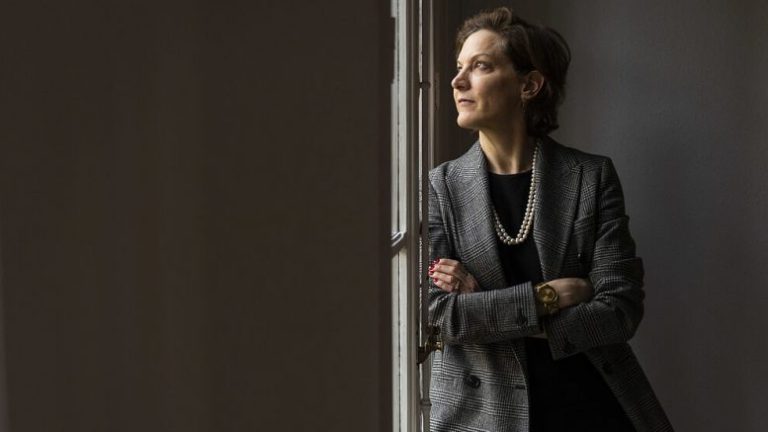11 de julio 2022

Children of Exile: The Births “Sowing Hope” in the Camp of Nicaraguan Farmers

PUBLICIDAD 1M
PUBLICIDAD 4D
PUBLICIDAD 5D
Wherever simplifications of political realities are being reproduced today, with the goal of driving hatred, the twilight is spreading

Anne Applebaum / Foto: Cine y Literatura
In the last few years, a number of books have been written that attempt to explain the ascent of authoritarian populism, from the left or the right, that threatens democracy. Steven Levitsky, Daniel Ziblatt, Jan Werner Muller, Nadia Urbinati, Enzo Traverso, Pablo Stafanoni, Federico Finchelstein, and Enrique Krauze are a few of the authors who have taken steps towards understanding this transverse phenomenon taking place in both developed and less developed societies, occidental and not, and which takes advantage of the technological changes of the XXI century.
Anne Applebaum, journalist and historian, staff writer for “The Atlantic” magazine, and wife of Polish politician Radek Sikorski, has written a recent book on the topic, entitled: Twilight of Democracy (2021). Applebaum’s take on the new flare-up of authoritarianism has the unique quality of coming from an intellectual who was a proponent of the liberalism that prevailed at the end of the XX century, and who was closely involved in the democratic transitions of Eastern Europe.
Appebaum recalls a 1999 New Year’s Eve party that took place in a house in the Polish countryside, a celebration to bid farewell to the Twentieth century. At this party, she noted that many of her friends from Eastern Europe – who in their youth had embraced Liberalism – by 2010 were already involved in nationalist and xenophobic movements, generally conservative or reactionary. Along with the return to nationalism and the rejection of globalization, came a new religious fervor, Catholic or Protestant, accompanied by antisemitism, Islamophobia, and other forms of racism.
Many of her Polish friends who were gathered at that end-of-the-century party, were now functionaries or active followers of the Kazcynski brothers’ Justice and Law party, and could no longer distinguish where anti-communism ended and anti-liberalism began. Together with their rejection of universal rights, they began to doubt civil and cultural pluralism; they denied the demands of the minorities and the migrants, and placed their bets on a homogeneous republicanism, like the one they had fought against in their anti-Soviet youth.
When events and leaders that threatened the Europeanism of the post-Cold War began to emerge – Brexit, Trump, Orban, Salvini, Le Pen, Marecha, Voz – Applebaum understood that the new right was being born out of a deep uneasiness with liberal democracy. Her book attempts to explore that discomfort, by rereading Julien Benda, Hannah Arendt, Theodor Adorno and Karen Stenner. From one and another, she derives the idea that authoritarian populism is nothing more than publicly driving hatred, through a network of media operators that sell, at a low price, simple and Manichean images of reality.
Authoritarianism, Applebaum says, on both the right and left, is nothing more than intolerance for complexity. The lack of distinction, or the inability to differentiate among political phenomena, is one of its essential components. This new demagogy runs against the current of a long and erudite tradition of rational classification that has continued on from medieval theology through modern science, passing through illustrated naturalism. Instead of this, the new demagogy is characterized by establishing analogies and identifications between distinctive entities.
Not only that. In addition to analogies, authoritarian populism needs to invent complicities – “diabolic causations” as Russian-French historian Leon Poliakov called them – among unlike historical processes. The regimes of the Bolivarian bloc, for example, share with the Kremlin the thesis that NATO provoked Russia’s invasion of Ukraine. It’s not a matter of a confirmable reality but of a speculative thread that establishes equivalencies and illusions by blurring the facts with the perceptions of them. Whether NATO really threatened Russia isn’t as important as the fact that Moscow perceived the very remote possibility of Ukraine’s joining that alliance as a threat.
The same could be said of the analogies so common in the circles of the new Ibero-American right (Bolsonaro, Vox, Frena, Kast, Milei…) that all the Latin American left currents are communists, when not specifically called followers of Castro or Chavez. That hate-oriented reading loses all the factual realities of a government’s programs and actions, and speaks only of the declarations or the tweets. Understanding of policy is reduced to the social networks, which are, in turn, the means for sharing caricatures and simplifications in all directions.
Journalist Carlos Bravo Regidor recently stated that medieval demonology – or the analytic language of John Wilkins who evoked Borges – was more willing to practice the art of differentiating, which is one of the central mechanisms of intelligence. We have Satan, but we also have Shayton and Iblis in Muslim thought, Angra Mainyu in Zoroastrianism, and even multiple minor evil spirits in the Bible and the Koran.
As Applebaum says, for the demagogues to win, for democracy to end up corroded and eventually collapsing, not only must there be messianic leaders on the right or on the left. There must also be those that Benda called “clerics”, who later called themselves intellectuals and today are the operators of social networks, political marketers, media manipulators, influencers and activists. Wherever simplifications of political realities are being reproduced today with the goal of driving hate, the twilight is spreading.
Article originally published in El Estornudo.
PUBLICIDAD 3M
Historiador y ensayista cubano, residente en México. Es licenciado en Filosofía y doctor en Historia. Profesor e investigador del Centro de Investigación y Docencia Económicas (CIDE) de la Ciudad de México y profesor visitante en las universidades de Princeton, Yale, Columbia y Austin. Es autor de más de veinte libros sobre América Latina, México y Cuba.
PUBLICIDAD 3D